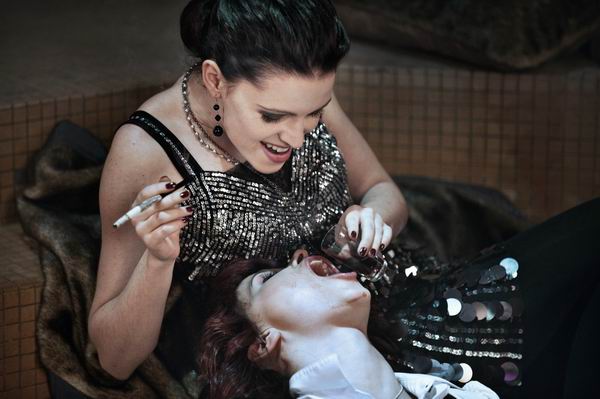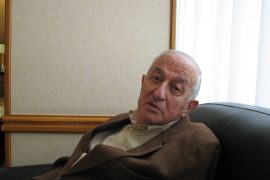Interview – Ola Salo
After twenty years, the vivacious Swedish artists have decided to end their fruitful feather and glitter adorned career. The band first came to widespread attention in 2000 with the now legendary It Takes a Fool to Remain Sane, which catapulted them to Scandinavian stardom for the whole decade to follow, with occasional songs also climbing the charts outside the cold countries of the North. That happened, for example, in 2007, when they represented their country at the Eurovision Song Contest with their upbeat song The Worrying Kind. The leader of this dazzling procession, the openly bisexual singer Ola Salo, imagined The Ark as a Noah’s ark for all those who were “different” and became their colourful messiah. When their career in the US came to a standstill due to an inappropriate joke regarding 9/11, Ola didn’t take long to recover and shone as the son of God in the Swedish version of Jesus Christ Superstar. In mid-September he is going to stand on stage for the last time, fronting a band he first performed with at the age of fourteen (dressed in a glamourized ski suit, needless to say).
May 2011. Ola Salo agrees to the interview. Three broken bones in the foot, six hours in the ER, one nervous breakdown, a few supplicant phone calls and five hours of driving later I finally arrive in Milan. Ola and I meet on the eve of the Eurovision Song Contest semi-finals. “How are you doing this year?” he enquires. “Quite well,” I reply. “This year we have a really good singer, not like last year.” “What happened last year?” “Oh, nothing, nothing…,” I quickly avoid having to explain last year’s fiasco. After the mandatory crash course on Slovenia we turn our attention to the land of Vikings and blonds.
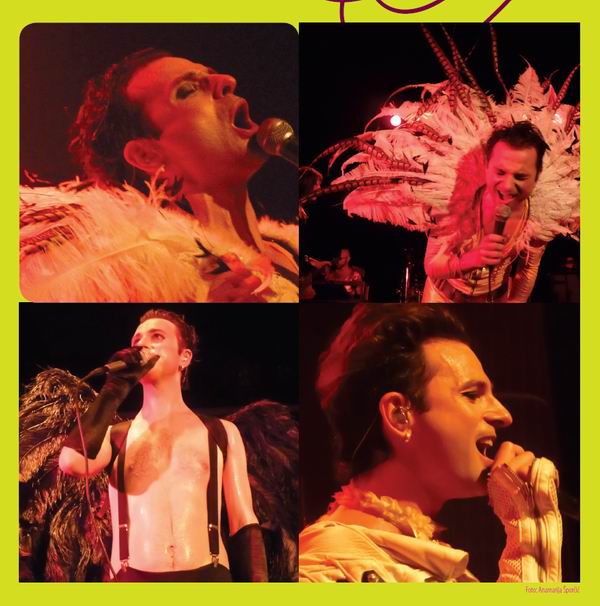
Sweden is always presented to us as a role model country in terms of human rights, social welfare and the like… Are things really that wonderful?
Yes, it sounds like a nice country to live in. (smile) And in many ways it is. Perhaps we were just lucky because the previous century was a lot more peaceful for Sweden than it was for some other countries. We didn’t take part in wars, we weren’t part of any major political blocs and for the majority of the past hundred years we had a social democratic government that was quite visionary and successful in building up our industry, but also in addressing social issues. Of course there are also problems, as in all countries, and there are a lot of double morals and political correctness that sometimes leads to double morals: people say something in public debate and then you realize that that’s not what they mean. Sweden’s done very well in presenting itself as a democratic, open-minded country. However, the mentality in Sweden is probably the same as anywhere else. What Swedes are very good at is saying the “right” thing in the public debate. (laughter) Now Sweden is in a bit of a state of shock because an extreme right-wing party actually made it to parliament in the last election a year ago and that was a big shock to all the people who believed such a thing could not happen in Sweden.
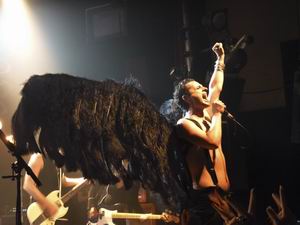
Sweden is also known for being gay-friendly. In spite of this, can one still sense a negative attitude towards bisexuality? You know, the usual – “bisexuality doesn’t exist”, “you’re all really just closet cases”, etc.
That is true, the gay and lesbian community is pretty well ahead in Sweden, sexual orientation is not often an issue. The bisexual community, if there is one… I think that is actually the problem, that it does not exist as such. Bisexual people tend to “fall between the chairs”, as we say in Swedish, they disappear somewhere in between. I wouldn’t say that the attitude is negative, I think it’s just that there’s a sort of confused attitude. And it is true that if you are bisexual people tend to either regard you as a semi-closet homosexual or as “gay chic”, someone who’s faking homosexuality for whatever reason.
Do you hear that more frequently now that you’re married?
Actually, no, I haven’t heard many people commenting on it. Perhaps such rumours simply do not reach me. I think that there were a lot more comments at the beginning of my career. People were provoked, and these people were neither the straight conservative people nor the LGBT community, the people who were most provoked were people who would regard themselves as being very open minded but maybe weren’t. Like the music press people….
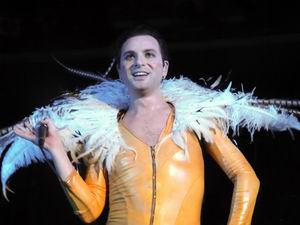
Perhaps we shouldn’t hold that against them, as music history is indeed full of cases when artists faked their sexuality for promotional reasons…
Many people regarded it as a pose at the time. To be honest… I was always open about my bisexuality because I realized that it was not unproblematic and that it created a lot of confusion. Maybe sometimes I became a bit frustrated but in the end I never really had many problems because of it. I think I came out in a time when the situation was starting to become much more open about both homosexuality and bisexuality.
About ten years ago The Ark released Father of a Son, a song in support of gay adoption. This song must have been quite controversial even for Sweden, was it not?
No, it wasn’t very controversial. (laughter) And it was certainly not nearly as controversial as I wanted it to be. (laughter) This may sound crazy, but this is exactly how it happened. Until the summer of 2002 you were not allowed to adopt children if you were a homosexual couple and in autumn there was going to be an election. Everyone expected gay adoption to be a big issue and I thought there would be a big fight about it. So I wrote this song that was to come out just before the election and I thought it was going to be a real “hot potato”. But then they just suddenly decided in the summer of that year that gays and lesbians could adopt children. (smile) So when the song was released two or three months later, it was already out of date in some way. And of course people who considered themselves to be politically correct already thought that this was an obvious thing, so the song was not really provocative. However, I thought that writing the song was still very important, because a decision in the parliament doesn’t have an immediate effect on the mentality of the people. And if you go out to the countryside or to other countries where we had a big audience, these things were much more provocative. It was important because I knew that with my songs I could reach people who normally wouldn’t take part in this discussion or had a negative view and if I could get them to sing along in a song maybe that could make a bigger difference than actually changing the law in parliament. It’s true that it is still very hard for homosexual people to adopt children because the attitude is still very negative and I think that homosexual couples who decide to take such a step still meet with a lot of negativity. The last relationship I had had when writing this song was with a guy and I knew that there was a chance that the person I decided to create a family with could either be a man or a woman. And if it were a man I would definitely want to have the same rights as a heterosexual couple. So Father of a Son was a very important song and a big thing for me also on a personal basis.

You’re also known to be a son of a priest. Many musicians, especially in the rock tradition, turn their backs on their religious upbringing, but you seem to have embraced it…
For me a big part of The Ark project was to find this third way between following in my parents’ footsteps and breaking up with it completely and going in a totally different direction. I believe very much that your roots and your upbringing are an important part of your identity, whether you want it or not. And I believe that you will not be totally free until you find a way of incorporating these elements into your identity, to come to peace with it. And that’s especially difficult when it comes to religion because it’s hard to take the good parts of it without taking the bad parts. Even if you don’t want to be a Christian the same way your parents were, maybe you still want to follow certain teachings, perhaps you like the philosophical aspect of it…. But you don’t want the shame, the guilt, the sexual repression, or the idea that you’re not in control of your life, that you’re controlled by fate and God’s whims. I think that I had in some way embraced religion and approached it with respect and interest to come out with a life philosophy that was entirely my own. In this way I could collect strength from my roots, but did not have to deal with aspects of it that made me unhappy.
Speaking of religion… How come you decided to do a duet with Carola recently?
Well, Carola is an amazing artist. And she’s totally crazy. (laughter) She’s just very intriguing, an interesting person, she’s an enigma. She also has a fantastic voice and she’s got incredibly strong energy on stage. When she won the Eurovision in Italy, she started her number by running down a staircase, wailing like hell… (Ola offers a quick demonstration) And it’s direct broadcast that’s going out to millions of viewers. How do you find the self-assurance to do that? Just walking down stairs when being filmed by a camera is hard enough, and she’s running down, screaming… (laughter) I’m just really impressed with her as an artist and she’s also very interesting as a person. Ok, so she scares me a little as well (smile), but that’s also what makes her interesting. It is true that her views can sometimes be a bit… strange, but there aren’t very many people like her in Sweden. She’s unique, she believes in herself and she has a really powerful presence. Swedish people can sometimes be really boring, because we’re too apologetic. I’ve always been fascinated by Carola and that is why I wanted to do this duet with her.
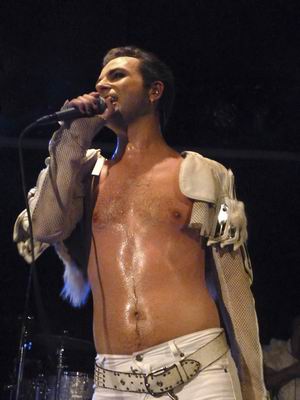
The Ark are also known for the lyrics, which deal with rather serious topics, from LGBT rights to suicide. But they are accompanied by crazy outfits and playful glam rock or pop music which doesn’t seem to match the lyrical content at all. Are you not afraid of obscuring the message with all the theatricalities?
Of course, that’s always a risk, but it’s a risk we’re very much aware of and one we have consciously decided to take. Our aim has been to be a philosophical band but at the same time be a very spectacular and flamboyant visual band. I admit that that is pretty difficult because it’s always a balance act, and although it may seem easy you sometimes have to work really hard to find a way of saying something complex or philosophical in an easy and pleasant way. I think that when The Ark are at our best, we manage to put those aspects together.
When I first heard your music about ten years ago, I wondered why on earth you sounded so damn happy about everything. Then I listened to you some more and realized what it was you were trying to achieve…
My whole life I have had a depressive nature and I could easily become a bit depressed. That is why my life philosophy has been a sort of a programme against depression. You know, writing sad songs in a minor key is really easy. But I need music to take me out of this state of depression, I need music to make me feel strong and happy and make me believe in life and life’s possibilities. I think many of our fans tend to listen to more melancholic music. And there’s a lot of melancholy in our music, it’s just that it’s a bit hidden. I understand why people like to think of us as “happy music”, that’s a very logical first reaction because what meets you as a listener is up-tempo music in a major key with a lot of theatricality and positive energy. And it’s supposed to be like that. I’ve read so many reviews that said The Ark was just another ”party band”, but I’ve decided long ago that I could take that, because the most important thing about our music is that it makes people happy and the world a slightly happier place. So if people just dismiss us as a happy-go-lucky band, I’m ok with that. An attentive listener, however, will soon discover that that’s just the energy of the music that strives towards happiness, if you read the lyrics you realize that these are songs that really acknowledge the difficult aspects of life. I’m constantly trying to talk about life as a struggle with a potential happy end, yet at the same time acknowledging how difficult it can be.
How come you decided to enter the Eurovision Song Contest? Because for most rock bands, that would equal certain death.
Yes, we’re a very different kind of a rock band in that sense, because the rock’n’roll culture is only one of the legs we’re standing on. The other leg is the culture of showmanship: Eurovision music, musicals, operettas… My love of all these genres is one of my main contributions to the band. Well, in addition to the music and the lyrics. (smile)
Do you think that might also be what’s held you back? Perhaps affected your career and success as well? Because in many ways you are too happy for the alternative and too controversial for the mainstream…
That’s probably true, I think that sums up what we do really well. Perhaps it is what’s held us back in terms of marketing but it also sums up my vision with this band, so I’m quite proud of hearing that I seem to have achieved what I had set out to do all along. Of course there were times when, in some countries and in some periods, we actually managed to be a band that talked about complicated stuff like the alternative bands, but we did it in a way that communicated with the broader audiences. But then again most of the time we were probably too strange for some and too happy for the others, yes.
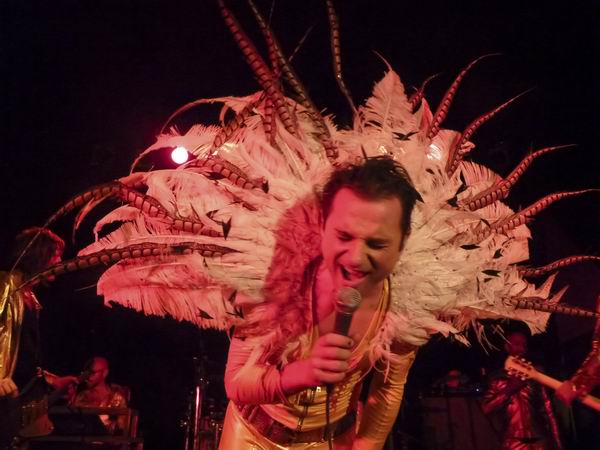
You are among those bands that made it the “old” way, you’d been working hard for nearly ten years by the time you finally got a record deal and I’d say the music industry has changed quite a bit since your beginnings. How has this affected you?
There’s certainly less money in most aspects of it and it’s becoming more and more important to tour. That doesn’t really bother us because we’ve always been a very strong live act, it’s been our main claim to fame. But of course one does tend to notice that all of a sudden the record companies have less people employed, that dinners have become less luxurious (smile) and videos are either cheaper or the record companies simply can’t afford them anymore. Because of all this it is also becoming increasingly more difficult to come and play in new countries and that is why we’ve recently mostly gone to countries where we already had an audience. It’s very hard to get someone to pay for your trip and no matter how much we’d like to go and see many countries we can’t afford to pay from our own pockets. To me personally that is probably the saddest thing about what’s happened to the music industry. But then again it’s apparent that it’s all very much a part of evolution and you get so many positive aspects, the possibilities of spreading music through the internet… so you sort of need to take the bad with the good.
You’re finishing your career at an interesting time. Your last song, a farewell to your fans, is called The Apocalypse Is Over, which somehow implies that an ark is no longer needed. Don’t you find that the apocalypse is just starting?
Yes, that’s true. But the song refers more to when we started out and we called our music apocalyptic rock. When we were teenagers we actually believed that the world was coming to an end and I was very inspired by the Book of Revelations and got most of my material for songs from there. The apocalyptic symbolism then remained with us, but more as a symbol for living in the now, today, because tomorrow might never come. Now, when we look back we realize that the apocalypse maybe was our youth, this part of our lives when it was most important that extraordinary things should happen all the time and we didn’t care about tomorrow. But now we’ve all got kids and all of a sudden that “tomorrow” has gained quite a lot of importance (smile). The romantic idea about the apocalyptic lifestyle has sort of… vanished. I actually know that The Ark’s music and songs are needed more than ever… but maybe someone else can sing them. I would love to see a new Ark.
What are your plans now that you have decided to end your career with The Ark? Are you retiring for good?
Retiring from the notes and rhythms? No way! I’m going to write music for other people. Sooner or later I’ll realize what kind of music I want to make in my own name. Until then I’ll probably guest star on different occasions and do occasional concerts with different line-ups.


